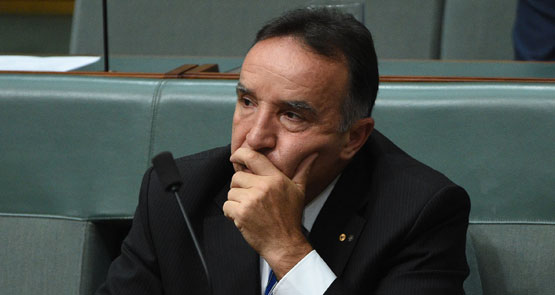
Lost amid the hubbub of election speculation, the Savva book and the Coalition’s division and confusion, last week the government quietly signalled its downgrading of the most important parliamentary committee.
When Labor’s John Faulkner left politics over the 2014-15 summer break, he left an important legacy: a bill substantially overhauling Parliament’s Joint Committee on Intelligence and Security, which, unlike other committees, is separately established under the Intelligence Services Act. Faulkner wanted to overhaul the clumsy process of allocating spots between the major parties and the two chambers on the committee and, more importantly, give the committee greater oversight power in relation to intelligence, security and counter-terrorism agencies — including the ability to initiate its own inquiries.
On Faulkner’s departure, responsibility for this private member’s bill, called the Parliamentary Joint Committee on Intelligence and Security Amendment Bill 2015, passed to Labor’s Senate leader, and JCIS member, Penny Wong.
The importance of JCIS has grown in recent years but has been turbocharged by the Abbott government’s expansion of the government’s already draconian security laws in 2014 and 2015, including the introduction by Malcolm Turnbull of the country’s first mass surveillance scheme. It now has a much larger remit in terms of reviewing legislation and will have a heavy workload in coming years, in addition to its traditional role of operating as a kind of estimates committee for intelligence agencies. The nature of the committee’s work has altered, too; more of the issues before it now relate to communications technology — not an area on which politicians, as a whole, have much expertise.
Last week, after a year languishing in limbo, the government brought Wong’s bill on for debate — and then revealed, without alerting Labor beforehand, that it would be opposing it. Former defence minister David Johnston rose and argued that the bill would be rejected, saying “the system in place is not broken and requires no fixing”. Johnston claimed that there was more than sufficient “independent” oversight by the government-appointed Inspector-General of Intelligence and Security and the Independent National Security Legislation Monitor.
The INSLM is the position the government tried to kill off in 2014 before backing away. And anyone who watched the wretched performance of Vivienne Thom as IGIS can have no faith that underfunded office is a genuinely effective oversight mechanism.
But there’s a wider context for the government’s rejection of greater parliamentary oversight of agencies, and a more effective JCIS. One is the new chair, far-right Tasmanian MP Andrew Nikolic, who is on-the-record as opposing the mere act of debating the powers of security agencies — one of the basic functions of JCIS. Nikolic is one of Tony Abbott’s strongest supporters, having been a whip for Abbott during the latter’s failed prime ministership. Making Nikolic committee chair might be one of those half-smart plays that Malcolm Turnbull seems to like; it throws a bone to his internal enemies and ostensibly limits the capacity of Nikolic to talk on security issues. MPs can go to jail for two years if they reveal the workings of the committee, and, as chair, Nikolic will have to be less voluble on matters that are before the committee.
But given Nikolic’s heartfelt view that security powers are simply too important to be publicly debated, it’s more likely an effort to turn JCIS into a rubber stamp. Under chairs Anthony Byrne (chair while Labor was in office) and Dan Tehan (under Abbott and Turnbull), the committee showed a willingness to seriously investigate proposed legislation and, when necessary, recommend significant changes. Under Nikolic, it is likely the committee will be more inclined to rubber stamp legislation — and therefore more likely to create internal conflict. JCIS has a long history of unanimous reports, but with Nikolic chairing it, the chances of dissenting reports have gone up dramatically.
Another signal of the government’s views is the appointment of Liberal MP Jason “orgasm” Wood to the committee to replace Tehan. Wood was a Victorian police officer before entering politics — working in counter-terrorism. The chances of Wood bringing a critical perspective to the ambit claims and unevidenced assertions of his erstwhile colleagues in state and Commonwealth security agencies don’t appear to be strong. Moreover, and inexplicably, serial assailant of civil liberties Philip Ruddock remains on the committee, despite being appointed, laughably, as a “Human Rights Envoy” by Turnbull. Liberal Senator David Fawcett remains the most intelligent, mature Liberal on the committee — indeed, he should have been made chair, not the Tasmanian reactionary.
These membership arrangements will only remain in place until the election — the committee will need to be reconstituted in the new Parliament. If Turnbull wins, perhaps he’ll overhaul it to remove the bitter taste of rubber from it. But for the moment, it seems as though the Prime Minister wants a poodle, not a watchdog, on security matters.








Crikey is committed to hosting lively discussions. Help us keep the conversation useful, interesting and welcoming. We aim to publish comments quickly in the interest of promoting robust conversation, but we’re a small team and we deploy filters to protect against legal risk. Occasionally your comment may be held up while we review, but we’re working as fast as we can to keep the conversation rolling.
The Crikey comment section is members-only content. Please subscribe to leave a comment.
The Crikey comment section is members-only content. Please login to leave a comment.